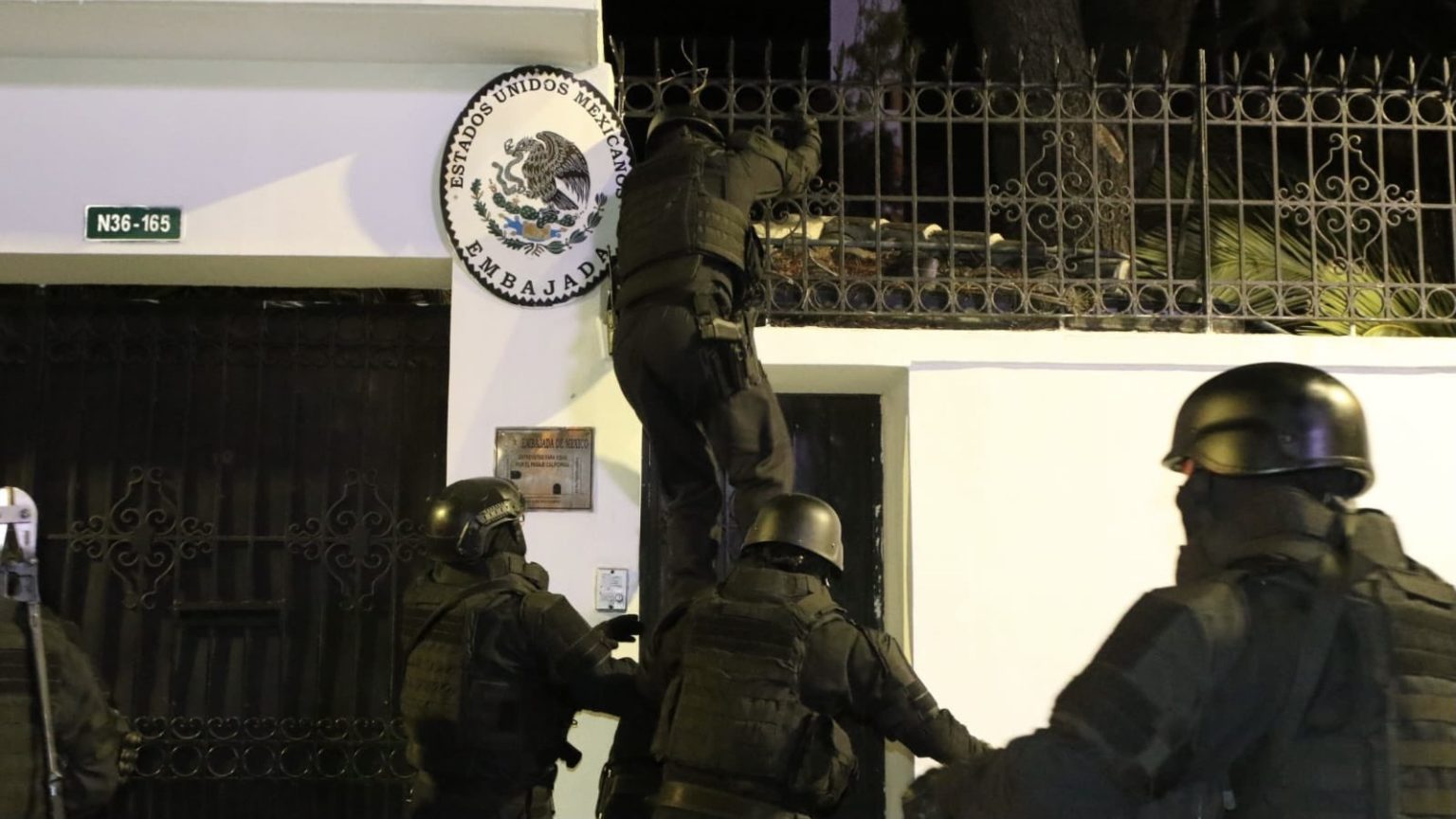Ecuadorian police break into Mexican Embassy, arrest former Ecuadorian VP Jorge Glas
Original article by Zoe Alexandra republished from peoples’ dispatch under a Creative Commons Attribution-ShareAlike 4.0 (CC BY-SA) license.

After the Ecuadorian National Police forcibly entered its embassy in Quito, Mexico announced the suspension of diplomatic relations with the country
Lee en español aquí
Late on Friday April 5, dozens of Ecuadorian police officers forcibly entered the Mexican Embassy in Quito and detained former Ecuadorian vice president Jorge Glas. Glas had been conceded political asylum by Mexico earlier that day after having applied in December 2023 amid intensified political persecution against him.
The move has been widely condemned by nearly the entire political spectrum in Mexico as a grave violation of Mexican sovereignty and has also been widely condemned by progressives in Ecuador.
Following the incident, Mexican President Andrés Manuel López Obrador and Foreign Minister Alicia Bárcena announced that Mexico was suspending diplomatic relations with the country.
Roberto Canseco, the head of Foreign Ministry and Political Affairs at the Mexican Embassy in Quito who was present when the incursion took place, spoke to the press shortly after the incident. “They threw me to the floor. I tried to physically stop them from entering but like criminals they raided the Mexican Embassy in Ecuador. This is not possible, this cannot be, it is insane,” Canseco told reporters incredulously.
The diplomat told reporters that there had been no prior warning to the police raid, but that it clearly happened because Glas is being persecuted. He also expressed concern over the whereabouts and wellbeing of the former VP.
He added, “Risking my life, I defended the honor and sovereignty of my country.”
The unprecedented incident took place amid rising tensions between the two countries. Jorge Glas had been seeking refuge at the Mexican embassy since December 18, 2023 and residing at the embassy as a “guest” after Ecuadorian authorities began to intensify pressure on Glas and summon him for investigations. This past week, the government of Daniel Noboa announced that it declared the Mexican Ambassador Raquel Serur Smeke a “persona non-grata” allegedly in response to comments made by President López Obrador in his morning press conference which insinuated that Noboa had benefited from the assassination of presidential candidate Fernando Villavicencio. However, many analysts have pointed to Glas’ presence in the embassy as the key factor behind Quito’s attacks on Mexico, and the events of April 5 seem to have confirmed this theory.
Jorge Glas: Victim of lawfare in Ecuador
Glas spent five years in prison, after being convicted of criminal conspiracy in the Odebrecht case, as part of the vicious lawfare campaign against members of Rafael Correa’s administration. Glas was later convicted in April 2020, along with Correa, in the “Bribes Case”, which alleged that they and 18 other government officials accepted bribes from private companies in exchange for public contracts. As prosecutors were unable to find evidence that the two received bribes, Glas and Correa were accused of “psychic influence” on their subordinates who allegedly carried out these deals and sentenced to several years in prison. Correa was also banned from participating in politics for 25 years.
Read more: Rafael Correa terms prison sentence an act of political persecution
Throughout the intense lawfare campaign against him and others, Glas has maintained that he is innocent and that both the charges and the harsh sentencing of him constitutes political persecution.
During the Correa presidency, Glas was one of the key leaders in the “Citizen’s Revolution” political project, which sought to make important social and economic reforms to better conditions for the majority. During this period, the Correa administration launched a Constituent Assembly to rewrite Ecuador’s constitution to guarantee essential rights for all, among other measures to promote national culture, Indigenous rights; it promoted Latin American regional integration over ties with the US and kicked out the US military base; and maintained anti-neoliberal economic policies, favoring social investment over cuts to public spending and social programs.
This project was brought to a halt in 2017 when Lenín Moreno was elected president and made a volte-face in Ecuador’s policies across the board, taking out a massive loan from the IMF, exiting regional integration spaces and attacking the country’s regional allies and economic partners like Venezuela, and imposing harsh austerity measures and brutally repressing protests against the measures. Under Moreno, the Attorney General also began its targeted attacks on leaders and officials of the Citizen’s Revolution.
Glas was eventually released on November 28, 2022 and granted “provisional freedom” as he had fulfilled over 40% of his prison sentence. However, in December 2023, days after he arrived at the Mexican embassy and weeks after Daniel Noboa took office as president, a judge revoked Glas’ provisional freedom and called for his arrest and imprisonment. Fearing for his life, Glas remained at the embassy and applied for political asylum, which was granted April 5, 2024.
The left in Ecuador responds
Progressive groups in Ecuador immediately expressed outrage at the actions of Noboa’s government and the National Police and issued sharp condemnations.
The Confederation of Indigenous Nationalities (CONAIE) wrote in a statement on X, “The violation of the Mexican embassy in Ecuador is an extremely serious fascist act that threatens diplomatic relations and international law…It is worrying to observe how the authoritarian and fascist government of Ecuador uses force to secure its political trophies. This flagrant violation not only affects bilateral relations between Mexico and Ecuador, but also sends a dangerous message to the international community.”
Pabel Muñoz, the mayor of Quito and a member of the Citizen’s Revolution Movement party, stated, “Unacceptable, a global embarrassment. What just happened in the Mexican Embassy in Quito creates a complex situation for Ecuador before the international system and law. Is there any doubt that Jorge Glas is the victim of terrible persecution? The more concerning part is that he had already been granted political asylum.”
Correa also issued a short statement repudiating the attack on Mexico and the arrest of Glas, “What the government of Noboa has done is unprecedented in Latin American history. Not even in the worst dictatorships was the embassy of a country violated. We do not live under rule of law, it is a state of barbarie, with a guy who improvises [Noboa] that confuses the Homeland with one of his banana farms. We hold Daniel Noboa responsible for the safety and physical and psychological integrity of former Vice President Jorge Glas. To Mexico, its people and its Government, our apologies and eternal admiration.”
Mexico unites in defense of its sovereignty
People across Mexico have expressed outrage in response to the brazen violation of the country’s sovereignty and of international law. In the statement announcing the suspension of diplomatic relations, President López Obrador said it was “an authoritarian act” and a “flagrant violation of international law and Mexican sovereignty”.
Foreign Minister Alicia Bárcena said in an interview with TeleSur that in addition to suspending diplomatic ties, Mexico would take Ecuador to the International Court of Justice and all multilateral bodies over its unprecedented actions.
Presidential candidate for MORENA, Dr. Claudia Sheinbaum called the incident “an attack on diplomacy and international law that is inadmissible”.
Mexico’s Senate also released a statement “energetically condemning” the Ecuadorian government’s actions and demanding “respect to our sovereignty and to the integrity of our Embassy and diplomatic personnel.” They called on the Ecuadorian government to reconsider its actions and resume the diplomatic path to resolve issues.
Both traditional right-wing parties PRI and PAN issued condemnations of the police invasion, while their joint candidate in the upcoming elections released a lukewarm statement saying that diplomatic missions cannot be violated.
Honduran President Xiomara Castro and Venezuelan Foreign Minister Yvan Gil expressed their solidarity with Mexico and condemned Ecuador’s violation of international law.
Original article by Zoe Alexandra republished from peoples’ dispatch under a Creative Commons Attribution-ShareAlike 4.0 (CC BY-SA) license.

